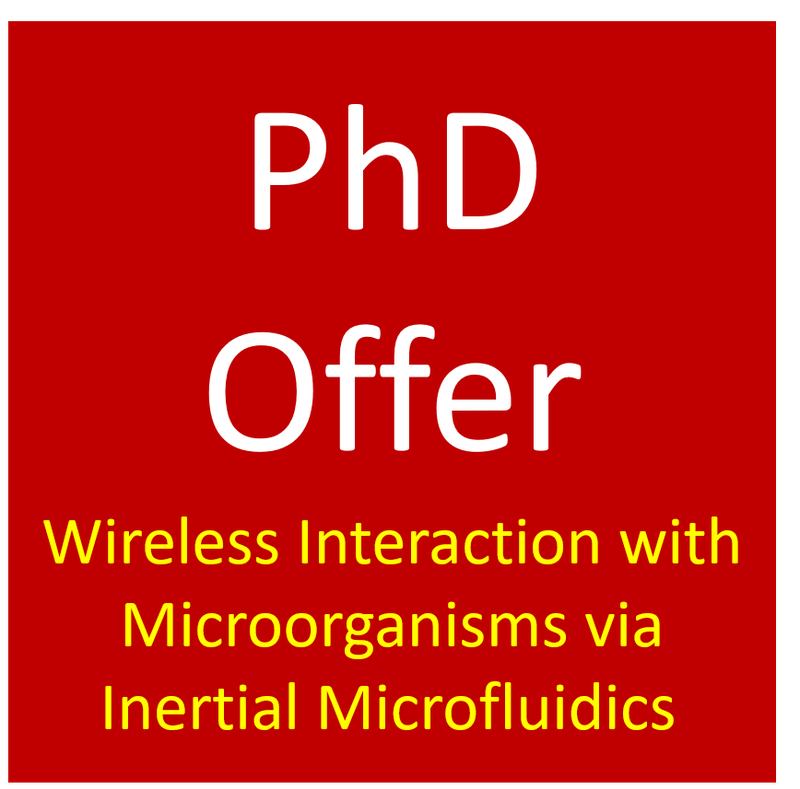PhD Position offer: Wireless Interaction with Microorganisms via Inertial Microfluidics (WIMIM)
08/01/2021
DOCTORAL INPhINIT FELLOWSHIPS PROGRAMME – INCOMING FRAME
INFORMATION CALL 2021
PhD POSITION OFFER FORM
Position
1. Project Title/Job Position title:
Wireless Interaction with Microorganisms via Inertial Microfluidics (WIMIM)
2. Area of Knowledge:
Physical sciences, Mathematics and Engineering
3. Group of disciplines:
Mechanical Engineering, Biomedical Engineering, Telecomunicacions Engineering
4. Research project/Research Group description (max. 2.000 characters):
The investigation of the electromagnetic properties of biological cells in microfluidicplatforms may enable wireless interaction with functional activity of microorganisms.
In particular, of high relevance is the membrane potential which is one of the most important living cell parameters. In this research project, we aim to provide results on the microwave interaction and a microfluidic microwave-based framework for sensing the membrane potential of cells. These results could enable to further advance the state-of-the-art of electromagnetic cell sensing and microfluidic control and its implication for measuring and interacting with the membrane potential of cells, which is of great importance for developing new engineered devices.
Recent advances in microwave sensing together with other applications of microwaves in the GHz frequencies, allow to further explore new narrow band windows for membrane interactions research. In particular, studies of the effects of a weak (non-thermal) microwave radiation on the cellular structures have clearly shown that the reaction of cells to microwave radiation is highly selective in frequency. Although various researchers have reported different values of the resonant frequencies obtained in experiments, all these frequencies were in the range of GHz.
Evermore, microfluidics has been proven useful for controlling functions with fluid power through the interaction of fluid streams, while performing these functions without mechanical moving parts, allowing for little noise generation in the process.Recently, inertial and elasto-inertial microfluidics, can provide further efficient single-particle flows in the center of the microfluidic channel and cell focusing that
guarantees optimal sensitivity and accuracy. In addition, microfluidics is a resourceful platform for the administration of perturbations to cells that can trigger the generation of membrane potentials as a means of self-protection.
5. Job position description (max. 2.000 characters):
The potential to wirelessly interact and communicate with fundamental biological organisms, like neurons and cells, could open an uncharted field of possibilities with extraordinary scientific and engineering impact in the health sciences and industry. With this overarching problem as a destination objective, the project proposes to design, develop and utilize a combination of cutting-edge electromagnetic and microfluidics technologies, supported by advanced experimental and computational equipment, to interact with biological organisms with the aim to (i) demonstrate the feasibility of the approach, and (ii) propose new bio-inspired solutions, products, and/or treatments.
The state-of-the-art research will cover from the theoretical modeling of the physical-biological system to the experimental implementation of the microfluidics-based laboratory apparatus able to transmit/receive signals to/from organisms. In particular, the first stage encompasses the fundamental modeling of the scientific principles involved in the foreseen systems and concepts. In a second stage, the candidate will assemble and validate the system performance of the proposed setup by means of laboratory measurements. The student will also be encouraged to further refine and push to the limit the principles and concepts applied. A final stage of the project will involve the integration of the setup to a full study involving real-world use cases.
The proposed work will be carried out in the new BioMicroCommFlow Lab in the CommSensLab research group with a solid background in both electromagnetic interaction with biological materials integrated in a team of PhD, postgraduate and undergraduate students working in related multiphysics biointeraction.
All PhD students have access to cutting-edge experimental and computational research infrastructures. Specialized seminars and international research stays will be an integral part of the PhD program. In addition, all doctoral students are eligible to participate in the educational activities offering broad-scope scientific and technical training, as well as other unique opportunities in the area of professional and personal development.
Contact:
1. Title: Professor, Technical University of Catalonia - BarcelonaTech
2. Full name: Lluis Jofre Cruanyes
3. Email: lluis.jofre@upc.edu

Comparteix: